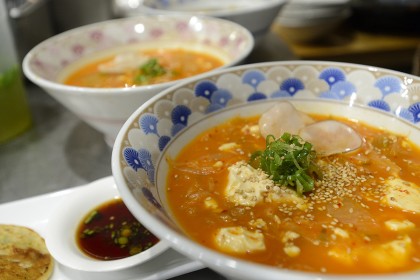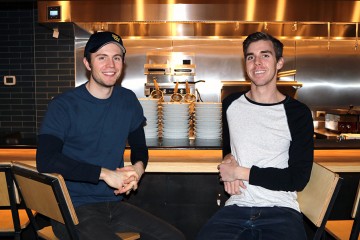Haenyo—perhaps the closest thing the world has to real-life mermaids—are a dwindling group of women divers, or "sea women," who exist in Korea. They free-dive for sea flora and mollusks, traditionally without the help of oxygen masks. While holding their breath for more than two minutes, these remarkable women serve as the breadwinners of their households, in an occupation that was once male-dominated and may soon cease to exist altogether.
Irvin Seo, a member of the Johns Hopkins University Class of 2014 and co-owner of a pop-up Korean restaurant named after these women, said he became obsessed with finding the haenyo while in Korea.
"They notoriously have the best product; their years of experience give them the ability to pick seaweed better than you can find in any store," Seo said. "Every haenyo I saw looked to be at least 60 years old, which makes their work more impressive but sad at the same time."
Seo and his business partner, Collin Morstein, co-own Haenyo, a restaurant that serves up traditional Korean food without a traditional storefront. Haenyo is currently hosting a pop-up at PekoPeko Ramen in Charles Village for the remaining two Mondays in October. Dinner is from 5 to 10 p.m.
"The juxtaposition between seeing the bustling heart of Seoul [South Korea] and the smattering of haenyos lugging their catch onto shore inspired the move to do traditional Korean food, rather than fusion or something 'cool and hip,'" said Seo of the restaurant's menu, which has highlighted made-from-scratch stews during the PekoPeko pop-up.
Before Haenyo, Seo and Morstein hosted an impromptu dinner party with friends. At the time, they had both left their jobs at Remington restaurant Parts & Labor—where they met—and had more free time on their hands to cook. They went to an Asian market and bought an assortment of things they wanted to eat. In Korean fashion, said Seo, they ended up making too much food and invited more friends to eat. The night went so well that everyone gave Seo and Morstein money for groceries.
Perhaps that was the beginning.

Image caption: Sundubu-jiggae (soft tofu stew)—kimchi dashi stock, soft tofu, red chiles, greens, lunchbox peppers, green onion
Image credit: Will Kirk / Johns Hopkins University
Now, their business relies heavily on the owners of existing restaurants—such as David Forster of PekoPeko Ramen, who also happens to be a Johns Hopkins alum—to help fulfill their goal of hosting one event per week.
"[David] offered his support without hesitation, almost reflexively," Morstein said. "Without people like David, our business doesn't exist."
The restaurant's raw ingredients are locally-sourced, with an emphasis on Karma Farm in Monkton, Maryland, whose available crops partially inform the menu. Morstein has spent his professional life working to increase the accessibility of responsibly-grown food, and prioritizes Haenyo's commitment to serve food grown by farmers who care.
Those ingredients compose Haenyo's dynamic menus, which always feature an assortment of vegetarian and non-vegetarian entrees and side dishes. Seo said that because their food can be a little aberrant to American tastes, they need to find customers who are willing to try new things.
"The world is moving pretty fast for Koreans and when that happens certain things get left behind, things that are still vital," he said. "That's the food that nourished me and my family and those before I was around. I can't quantify what … eating good old-fashioned Korean food with my family did for me, but I know it was significant, and hopefully through this pop-up I can do the same for others."
Haenyo has taken over the PekoPeko kitchen three times so far this month, serving the dinner crowd that piles into the intimate space there.
Seo brings together several elements for each stew and flips panjeon, or savory pancakes, while Morstein garnishes and delivers dishes to hungry customers. While everything they do is collaborative, Seo focuses on the restaurant's cuisine and Morstein on business development, informed by his marketing degree from Towson.
For Seo, who studied behavioral biology at JHU, it's a different story.
Once in the "real world," Seo said he thought he ought to try something other than research or grad school while he was still "young and dumb enough." He went to work in restaurants where chefs taught him the science and methodology behind food and flavor.
"I was surprised at how it is a craft as much as it is an art, and the potential to exercise either made cooking engaging to me," Seo said. "My mother taught me to cook at an early age, but it was mostly the 'how,' not the 'why.'
"Maybe I'm pulling at a thin thread here, but I think my experience at Hopkins gave me a lot stronger desire to explore the foundation of something, to try to understand all the steps and guess what's next. I just needed to find something that I could eat after I was done working on it."
Haenyo will move to the pop-up stall in R. House in mid-November. Follow them on social media to see where they will be next.

Posted in Student Life
Tagged food, charles village









